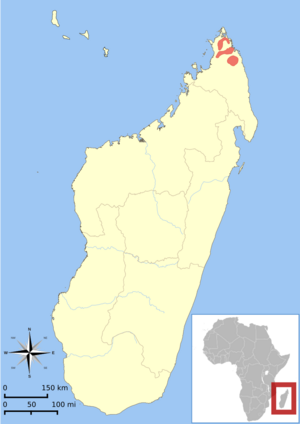Amber Mountain fork-marked lemur facts for kids
Quick facts for kids Amber Mountain fork-marked lemur |
|
|---|---|
| Conservation status | |
| Scientific classification | |
 |
|
| Amber Mountain fork-marked lemur range |
The Amber Mountain fork-marked lemur (Phaner electromontis) is a small, furry animal. Like all other lemurs, it lives only on the island of Madagascar. This lemur is a type of primate, which means it belongs to the same group of animals as monkeys and apes. It gets its name from the Amber Mountain National Park where it lives. People sometimes call it the Montagne d'Ambre fork-crowned lemur or Tanta.
What Does the Amber Mountain Lemur Look Like?
The Amber Mountain fork-marked lemur has light grey fur. This light grey fur covers its back and belly. It has a thick, dark stripe that runs from its head down its back. Its tail, hands, and feet are also dark in color.
Scientists have not published many official measurements for this lemur. However, some research suggests their body is about 27.2 cm (10.7 inches) long. Their tail is usually longer, around 34.4 cm (13.5 inches). On average, these lemurs weigh about 387 grams (13.6 ounces). That's about the weight of a can of soda!
This lemur looks a bit like other lemurs that are active at night. These include the Microcebus, Cheirogaleus, and Lepilemur. But you can tell the Amber Mountain lemur apart in a few ways. It is much larger than the Microcebus lemur. It also has a special forked pattern on its head. Plus, it makes very loud and unique sounds. You might also notice its unusual head-bobbing movements.
Where Does the Amber Mountain Lemur Live?
The Amber Mountain fork-marked lemur lives in northern Madagascar. You can find it in areas like Montagne d’Ambre and Ankarana. It lives specifically in the Montagne d’Ambre National Park. It is also present in Ankarana National Park.
This lemur also lives in two special reserves. These are called Analamerana and Forêt d’Ambre. You can also find it in the Sahafary Classified Forest. These lemurs prefer to live in both wet and dry forests. Scientists once saw a group of similar lemurs in Dariana. They are still trying to figure out if these are Amber Mountain lemurs or a brand new species.
How Are We Protecting This Lemur?
The International Union for Conservation of Nature (IUCN) says the Amber Mountain fork-marked lemur is "vulnerable." This means it could become endangered if we don't protect it. The biggest danger to these lemurs is the yearly burning of their forest home.
Even though their habitat is threatened, many of these lemurs live in the Montagne d'Ambre region. Scientists believe there are quite a few of them there. However, they haven't studied this species in great detail yet. The lemur is also listed in CITES Appendix I. This means it is highly protected. Trading these animals across countries is almost completely banned. This helps keep them safe from illegal wildlife trade.


